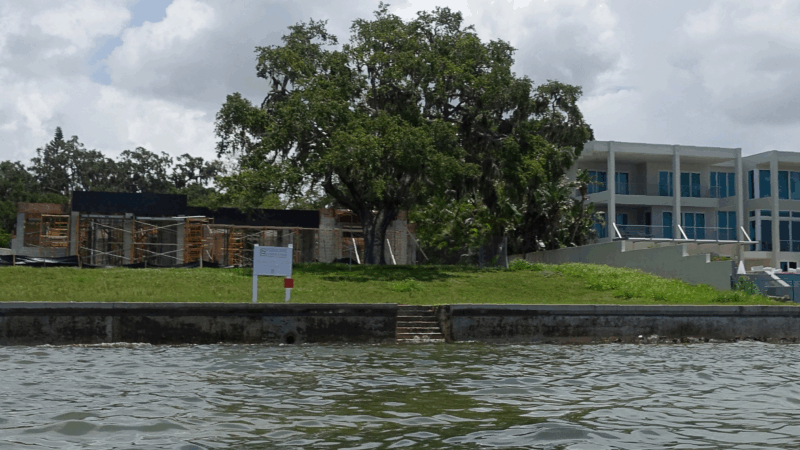For private flood insurance companies, the government shutdown is good for business
MIAMI — Among those feeling the pain of the government shutdown are people in coastal areas and other locations where they need flood insurance.
The government-backed National Flood Insurance Program stopped writing new policies on Oct. 1 and can’t resume until it’s reauthorized by Congress. That may force buyers to postpone or cancel home sales.
Andy Kasten, an insurance broker in Fort Lauderdale, says the shutdown is already having an impact in Florida — the nation’s biggest flood insurance market. Many people who live on Florida’s coasts are in high-risk flood zones where mortgage lenders require flood coverage.
Days before closing on the sale of a home this month, Kasten says one of his customers discovered he would need flood insurance. Unfortunately, because of the shutdown, the $700 annual flood policy he expected to purchase from the government program was no longer available.
“We just had to write a private flood policy, and it ended up costing him 12 hundred and change. So, because we had to wait, he had to purchase the more expensive policy,” says Kasten.
Private flood insurance has only been widely available since 2019, but now accounts for an increasing share of the residential and commercial market. For the industry, the government shutdown is an opportunity. John Dickson, the CEO of private insurance company Aon Edge, says “We’ve seen an incredible increase in interest and activity, a great number of quotes coming in that we haven’t before.”
The private flood market has grown rapidly over the last several years, in part, because it can provide coverage higher than the $250,000 limit available through the National Flood Insurance program. For people with homes or businesses in high-risk flood zones, policies from the government typically are cheaper than those from private insurers. But in areas without a high flood risk, private companies often have lower rates.
Trevor Burgess is the CEO of Neptune, one of the largest private flood insurance companies. On Oct. 1, the day of the government shutdown, Neptune went public and began selling shares on the New York Stock Exchange.
In an interview on CNBC, he said that, using artificial intelligence, his company can analyze the risk of individual properties. “Your house can be specifically underwritten for its risk,” he said. “So, we tell the truth to consumers. If we say that it’s $200 a year, it’s pretty low risk. If we say it’s $12,000, that’s pretty high risk. And if we say no, you should move.”
The government-backed flood program, by contrast, rarely declines to offer coverage, though policies sometimes are very expensive.
Neptune just released a study that proposes moving more customers from the government program to private insurance. It would allow customers currently with the National Flood Insurance Program to retain their policies. But, for new customers, the federal program would become “the insurer of last resort,” providing coverage only to those unable to buy a policy on the private market.
Amy Bach, with the consumer group United Policyholders, says private companies play a valuable role in the market. But she worries about how accountable they will be to consumers, especially after a major disaster.

As an example, she points to Superstorm Sandy. Months after the 2012 storm, complaints from policyholders and pressure from elected officials forced the National Flood Insurance Program to reopen many claims. “That’s what you get with a government-backed program,” she says. “You get accountability. And you don’t always get that in the private sector unless you sue.”
Another problem with the growth of the private insurers, Bach says, is that they “cherry-pick” the least risky homes and businesses in an area. That leaves the government program with the highest costs and creates additional issues for a program that, for years, has operated in the red. “I think it’s just going to make a challenging situation worse,” she says.
After Florida, Louisiana is the state with the most homes and businesses receiving coverage from the federal flood program. Louisiana Insurance Commissioner Tim Temple says the NFIP provides reasonably priced policies for people who work in fishing, oil and gas and the state’s other coastal industries. He says, “It’s imperative that we have a functioning and affordable national flood insurance program. And I don’t think private industry can come in and be the answer to all of those folks.”
Temple says the National Flood Insurance Program needs to be, not just reauthorized, but overhauled so that, over the long term, it keeps flood insurance affordable.
A Jan. 6 rioter pardoned by Trump was sentenced to life in prison for child sex abuse
Since receiving presidential pardons, dozens of former Capitol rioters have gotten into more legal trouble. In Florida, Andrew Paul Johnson was sentenced to life in prison for child sex abuse.
President Trump, Pam Bondi sued over sale of TikTok assets
The case, filed in a federal court in Washington, D.C., accuses the Trump administration of ignoring legislation designed to stop the spread of Chinese propaganda — and instead helping to broker a partial sale to businessmen close to Trump.
A rift between Spain and Trump widens over Spanish opposition to the Iran war
The Spanish government reiterated it would not let U.S. forces use two joint military bases in Spain as the U.S.-Israeli war in Iran escalates, widening a rift with the Trump administration.
Blackpink, modern K-pop’s trailblazing group, tries to find its way home
A new mini-album finds the world's biggest girl group in a tight spot: competing with its own legacy.
If you loved ‘Sinners,’ here’s what to watch next
So you loved best picture nominee Sinners. What should you watch next? We asked our audience to share their recommendations. They suggested Near Dark, The Wailing and other vampire horror films.
U.S-Israeli strikes continue across Iran, Iranian drones hit Azerbaijan
The U.S. and Israel said they conducted new strikes inside Iran overnight, targeting ballistic missile launchers. Iran claimed it struck a U.S. oil tanker in the northern Persian Gulf.






